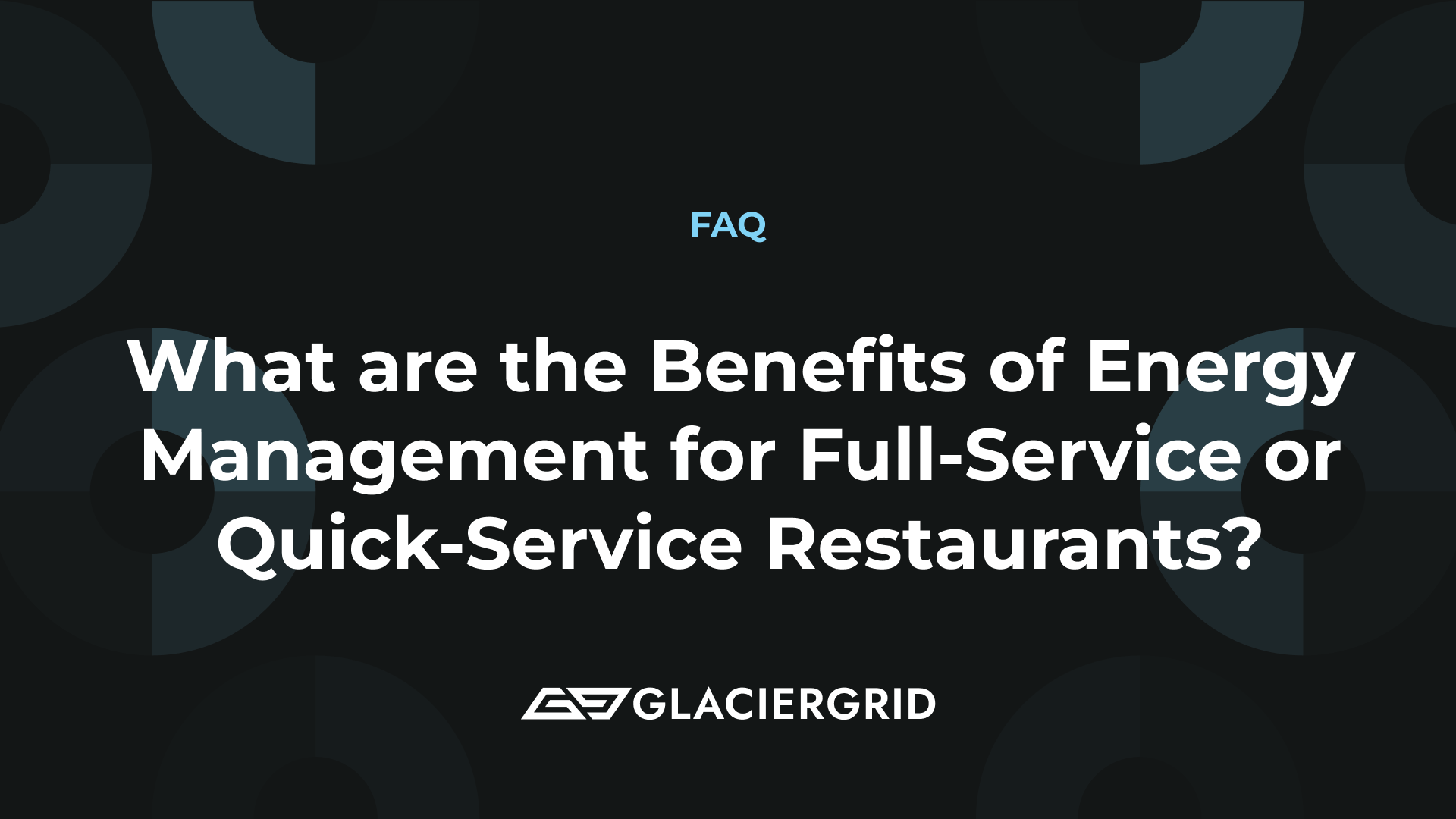What are the Benefits of Efficient Energy Management for Full-Service or Quick-Service Restaurants?

Full-service restaurants and quick-service restaurants that implement efficient energy management practices can experience a 50% decrease in energy consumption while maintaining their existing operating standards.
Aside from cost savings, other benefits include improved operations, lower carbon footprint, market competitiveness, and improved quality of food among others.
Let’s take a closer look at these benefits:
What are the benefits of efficient energy management for full-service restaurants?
Full-service restaurants are known for their welcoming ambiance, attentive service, and mouthwatering cuisine. Lighting, ambiance, the vibe, the temperature, the menu—these all play a crucial role in the overall dining experience. Some restaurants even implement efficient energy management practices that contribute to the restaurants’ success and diners may not immediately notice these. However, by implementing energy management practices, full-service restaurants can experience these benefits:
Enhanced ambiance and precise climate control
Efficiency energy management practices help maintain a comfortable and inviting atmosphere. This involves investing in energy-efficient lightbulbs and controlling the indoor environment. Full-service restaurants can opt to use more LED bulbs and optimize HVAC systems to maintain comfortable temperatures for customers. Smart thermostats can also help full-service restaurants maintain the perfect temperature that complies with standards like ASHRAE guidelines. Aside from ensuring that the establishment adheres to industry standards and policies, this is also an assurance that the restaurant’s indoor air quality is at optimal range for keeping the quality of food top-notch while remaining healthy for diners and staff.
Reduced energy costs
Since restaurants consume more energy than other commercial buildings, this is a really valuable benefit. Full-service restaurants typically operate with a diverse range of energy-consuming equipment—from ovens and stoves to refrigeration and lighting. Optimizing energy usage in the kitchen and dining area helps full-service restaurants significantly cut their energy bills without compromising the quality of service or the dining experience. Learn more about other energy hacks that restaurant owners need to know.
Operational efficiency
Efficient energy management not only trims expenses but also streamlines restaurant operations. Smart scheduling of equipment and lighting, plus proper maintenance routines, helps maintain a smooth workflow in the kitchen and dining areas, ensuring that customers enjoy a seamless experience. Integrating smart thermostats and temperature sensors also means that adjustments and temperature monitoring don’t have to be manually done by staff anymore—giving them more time to focus on the customers.
Market competitiveness
The benefits of energy management extend beyond the restaurant's bottom line. They enhance the restaurant's market competitiveness, making it an attractive choice for eco-conscious diners and business-savvy investors.
.jpg?width=1920&height=1080&name=What%20is%20Energy%20Management%20-%20Internal%20Grpahic%201%20(1).jpg)
Find out more about how energy management systems work for restaurants.
What are the benefits of efficient energy management for quick-service restaurants?
Quick-service restaurants focus on speed, convenience, and affordability. They have become a staple in our fast-paced modern lives. These establishments thrive on delivering meals in record time while ensuring quality and consistency. In the quest to meet the demands of today's diners, efficient energy management has emerged as a secret ingredient that quick-service restaurants can't afford to overlook. These are the benefits of efficient quick-service restaurant energy management:
Speed and efficiency
Energy management ensures that quick-service kitchens run smoothly and efficiently, enabling rapid meal preparation and delivery. Energy management systems can help streamline the cooking process by ensuring appliances are used at the right times and are properly maintained. This efficiency translates into quicker service and shorter wait times for hungry patrons.
Cost savings
Quick-service restaurants often operate with a high volume of customers and equipment. Identifying and addressing energy inefficiencies can help quick-service restaurants optimize their energy consumption which can lead to substantial cost savings and higher profit margins
Consistency and quality
Reliable energy management systems ensure consistent food quality, which is a must for any business in the food industry. Quick-service restaurants depend on uniformity and speed in their offerings, so well-maintained equipment and energy-efficient processes can definitely contribute to delivering that consistency.
How exactly does energy management help both full-service and quick-service restaurants reduce their energy bills?
Efficient energy management is not just about turning off the lights; it's a comprehensive strategy that offers tangible benefits by reducing energy bills. Here's a closer look at how energy management achieves this cost-saving feat for these dining establishments:
- Energy management increases equipment efficiency: Energy-efficient appliances and lighting systems with ENERGY STAR ratings reduce energy consumption, which leads to lower bills.
- It involves smart scheduling: Through optimizing kitchen equipment schedules, restaurants can avoid peak demand charges and high energy costs. This not only saves energy but also helps maintain a smoother workflow in the kitchen.
- Energy management practices include temperature regulation: Properly managing heating, ventilation, and air conditioning (HVAC) systems can help maintain consistent indoor temperatures without excessive heating or cooling—thus reducing HVAC-related energy costs.
- Preventative maintenance: Regular maintenance and servicing of equipment ensures that all appliances are in top working condition. You can avoid the huge costs that come with major repairs when equipment breaks down.
How does energy management contribute to sustainability in restaurants?
Sustainability is crucial in today's world, restaurants are increasingly expected to play their part in reducing their environmental footprint. Efficient energy management is a pivotal way in which restaurants—both full-service and quick-service—can embrace sustainability. Here's how energy management contributes to a greener and more eco-friendly restaurant industry:
- Lowering carbon footprint: Efficient energy management systems lead to a reduction in energy consumption, which, in turn, results in lower carbon emissions. This is especially important as restaurants are significant contributors to greenhouse gas emissions due to their energy-intensive operations.
- Ensuring compliance with regulations: Governments and local authorities are increasingly implementing regulations related to energy efficiency and environmental sustainability. Restaurants that adopt energy management practices are better positioned to comply with these regulations and avoid penalties.
- Renewable energy integration: Integrating renewable energy sources, such as solar panels or wind turbines, into the restaurant's energy mix can reduce their reliance on fossil fuels and lower their impact on the environment.
- Resource conservation: Effective energy management emphasizes the responsible use of resources. This includes reducing water usage, optimizing HVAC systems, and minimizing food waste, all of which contribute to sustainability.

Explore how GlacierGrid's Smart Building Solution elevated energy efficiency at a McDonald's franchise.
Unlock significant success for your restaurant with efficient energy management
Efficient energy management is a recipe for success for both full-service and quick-service restaurants. It enhances ambiance, reduces energy bills, and fosters sustainability, all while maintaining the quality and speed of service that customers expect and deserve.
At GlacierGrid, we're committed to helping restaurants of all types harness the power of energy management.
Contact us today to explore how our tailored solutions can enhance your restaurant's efficiency, cost-effectiveness, and sustainability. Savor the advantages of energy management, and watch your restaurant thrive in an increasingly competitive industry.

Interested in reducing operational costs and environmental impact?
Additional resources:







